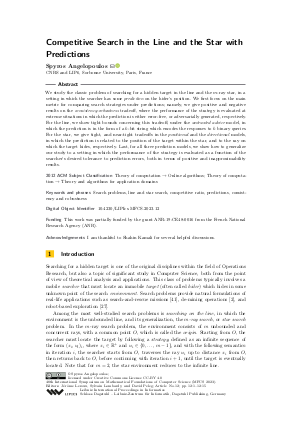@InProceedings{angelopoulos:LIPIcs.MFCS.2023.12,
author = {Angelopoulos, Spyros},
title = {{Competitive Search in the Line and the Star with Predictions}},
booktitle = {48th International Symposium on Mathematical Foundations of Computer Science (MFCS 2023)},
pages = {12:1--12:15},
series = {Leibniz International Proceedings in Informatics (LIPIcs)},
ISBN = {978-3-95977-292-1},
ISSN = {1868-8969},
year = {2023},
volume = {272},
editor = {Leroux, J\'{e}r\^{o}me and Lombardy, Sylvain and Peleg, David},
publisher = {Schloss Dagstuhl -- Leibniz-Zentrum f{\"u}r Informatik},
address = {Dagstuhl, Germany},
URL = {https://drops.dagstuhl.de/entities/document/10.4230/LIPIcs.MFCS.2023.12},
URN = {urn:nbn:de:0030-drops-185464},
doi = {10.4230/LIPIcs.MFCS.2023.12},
annote = {Keywords: Search problems, line and star search, competitive ratio, predictions, consistency and robustness}
}

 Creative Commons Attribution 4.0 International license
Creative Commons Attribution 4.0 International license



















































